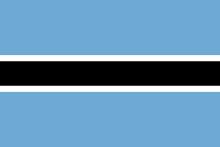This article needs additional citations for verification. (December 2016) |
 | |
|---|---|
| Minister of Basic Education | Fidelis Molao |
| General details | |
| Primary languages | English, Setswana |
| System type | State, private |
Education in Botswana is provided by public schools and private schools.[1] Education in Botswana is governed by the Ministries of Basic Education. and Tertiary, Research Science and Technology[2] Among sub-Saharan African countries, Botswana has one of the highest literacy rates.[3] According to The World Factbook - Central Intelligence Agency as of 2015, 88.5% of the population age 15 and over can read and write in Botswana were respectively literate.[3]
The Private schools are generally free to determine their own curriculum and staffing policies, with voluntary accreditation available through independent regional accreditation authorities. About 87% of school-age children attend public schools, about 10% attend private schools while roughly 3% are home-schooled.[4]
Education is compulsory over an age range starting between five and eight and ending somewhere between ages sixteen and eighteen. This requirement can be satisfied in public schools, state-certified private schools, or an approved home school program.[4]
Secondary education in Botswana is neither free nor compulsory.[5][6] In 2002, the gross primary enrollment rate was 103 percent, and the net primary enrollment rate was 81 percent.[5] Gross and net enrollment ratios are based on the number of students formally registered in primary school and therefore do not necessarily reflect school attendance.[4] Recent primary school attendance statistics are not available for Botswana.[5] As of 2001, 86 percent of children who started primary school were likely to reach grade 5.[5] In Botswana's education system, girls and boys have equal access to education. Girls are likely to drop out of secondary school due to pregnancy.[5]
There is also a large number and a wide variety of publicly and privately administered institutions of higher learning throughout the country. Post-secondary education, divided into college, as the first tertiary degree, and graduate school, is described in a separate section below.[4]
Botswana made great strides in educational development after independence in 1966.[7] At that time there were very few graduates in the country and very few Batswana attended secondary school. With the discovery of diamonds just after independence and the increase in government revenue that this brought, there was a huge increase in educational provision in the country. All students were guaranteed ten years of basic education, leading to a Junior Certificate qualification. Approximately half of the school population attends a further two years of secondary schooling leading to the award of the Botswana General Certificate of Education.[8] After leaving school, students can attend one of the seven technical colleges in the country,[9] or take vocational training courses in teaching or nursing. The best students enter the University of Botswana, Botswana University of Agriculture and Natural Resources, The Botswana Accountancy College and Boitekanelo College in Gaborone. A larger influx of tertiary students is expected when construction of the nation's second national university, The Botswana International University of Science and Technology, is completed. Many other students end up in the numerous private tertiary education colleges around the country. A high majority of these students are government sponsored. The quantitative gains have not always been matched by qualitative ones. Primary schools in particular still lack resources, and the teachers are less well paid than their secondary school colleagues.[4] In January 2006, Botswana announced the reintroduction of school fees after two decades of free state education.[6]
Total government expenditure on education as percentage of GDP in Botswana was reported to be 9.633% in 2009, the highest among Sub-Saharan African countries.[10]
- ^ "Botswana Education System". Scholaro. Retrieved 2022-05-28.
- ^ "Ministry of Education". Ministry of Education. Ministry of Education and Skills Development. Archived from the original on 2011-01-17. Retrieved 2015-09-20.
- ^ a b "Literacy - the World Factbook".
- ^ a b c d e Glavin, Chris (2017-01-25). "Education in Botswana". K12 Academics. Retrieved 2021-05-20.
- ^ a b c d e "Botswana6). This article incorporates text from this source, which is in the public domain.
- ^ a b "Botswana brings back school fees". BBC News. 2006-01-11. Retrieved 2010-05-01.
- ^ "Education in Botswana". Southern and Eastern Africa Consortium for Monitoring Educational Quality. Archived from the original on 2009-03-22. Retrieved 2009-03-20.
- ^ "Registration of Botswana General Certificate of Secondary Education School Candidates" (PDF). Botswana Examination Council.
- ^ UNESCO-UNEVOC country profile
- ^ "Government expenditure on education, total (% of GDP) - Sub-Saharan Africa, Botswana". World Bank. Retrieved 2020-07-19.